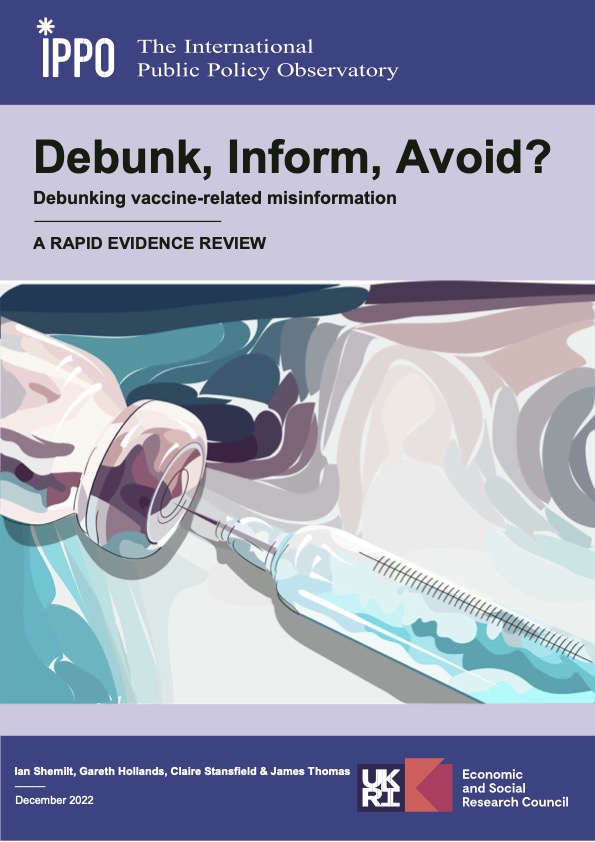Debunking Vaccine-related Misinformation: A Rapid Evidence Review

Ian Shemilt
Throughout the pandemic, misinformation about COVID-19 has proliferated in digital and physical environments, undermining public health efforts to tackle the virus.
Exposure to false or misleading claims about COVID-19 and other vaccines has been associated with serious and widespread harms to people’s physical and mental health, and rates of severe illness and death from COVID-19 are higher among unvaccinated people.

In 2022, the EPPI Centre (UCL), which is part of the International Public Policy Observatory (IPPO) collaboration, launched a rapid review of evidence for when debunking is likely to be an effective way of responding to misinformation about vaccines.
The focus and demand for this rapid evidence review came from initial conversations with public health communicators and policymakers about their experiences of tackling misinformation during the COVID-19 pandemic. These revealed that communications responses to myths and conspiracy theories about COVID-19 vaccines, and other health misinformation, had largely relied on foregrounding positively framed, accurate information in the minds of the public.
However, there was uncertainty about when it might be better to go further, by directly debunking or correcting the false claims, or when it might be better to avoid responding altogether?
We therefore conducted a rapid review of research evidence to investigate when debunking messages might be an effective tool to help to counter vaccine-related misinformation and its spread in digital and physical environments.
Debunking can be defined as any form of direct communication aimed at correcting, refuting or rebutting an established misinformation claim or narrative.
When debunking reduces people’s beliefs in vaccine-related misinformation, changes attitudes to vaccination, reduces vaccine hesitancy and/or increases intentions to be vaccinated, it could help to increase their uptake of vaccines.
However, when debunking unintentionally strengthens people’s beliefs in vaccine-related misinformation, increases vaccine hesitancy and/or reduces intentions to be vaccinated, it could instead discourage uptake.
What Did We Find?
Current research evidence suggests that communications aimed at debunking vaccine-related misinformation should be used judiciously and sparingly.
This proposal is broadly consistent with existing policies and practices of many national and local public health policymakers and communicators in the UK, which emphasise responding to false or misleading claims about vaccines by communicating accurate information and facts, and reserving debunking strategies for potential use in a more limited set of circumstances.
Debunking false or misleading claims about vaccines clearly can have a beneficial influence on misinformation beliefs and/or attitudes, among at least some people. However, such changes are not necessarily accompanied by positive changes in people’s intentions to be vaccinated. There is also currently high uncertainty about whether debunking messages encourage uptake of vaccines.
When Might Debunking Work Best?
Debunking messages are unlikely to influence people’s vaccine-related beliefs, attitudes or intentions in the same way. Communications of this kind may therefore be more successful when they can be formulated, tailored and targeted to specific subgroups of people, and specific misinformation narratives, based on insights derived from:
- public health surveillance data analysis;
- (social) media analytics;
- best practice toolkits and guidance;
- professional expertise, experience and judgement; and
- analysis and understanding of why different people hold and maintain specific vaccine-related misinformation beliefs.
Policymakers and communicators should continue with the practice of engaging trusted, influential people (‘key messengers’) to act as co-producers and senders of debunking messages and other communications aimed at countering vaccine-related misinformation to promote vaccine uptake.
More generally, policy makers and communicators should also continue to draw on insights from behavioural science when formulating debunking messages and other communications-based responses.
A key gap in the current research evidence base is the lack of any studies designed to assess the differential effects of ‘real-world’ messages developed to debunk dynamic and evolving vaccine-related misinformation narratives on beliefs, intentions and uptake behaviour over time in a large, diverse UK population sample.
If stakeholders judge there is a need to develop further research that more directly addresses uncertainties about if and when to debunk vaccine-related misinformation in a current UK context, then scoping and development of such research could be informed by insights from this review.
For more information about this review, please do email [email protected] and watch the video of our launch event below
